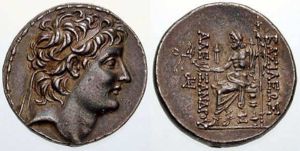
Alexander II Zabinas
Encyclopedia

Greece
Greece , officially the Hellenic Republic , and historically Hellas or the Republic of Greece in English, is a country in southeastern Europe....
Seleucid kingdom
Seleucid Empire
The Seleucid Empire was a Greek-Macedonian state that was created out of the eastern conquests of Alexander the Great. At the height of its power, it included central Anatolia, the Levant, Mesopotamia, Persia, today's Turkmenistan, Pamir and parts of Pakistan.The Seleucid Empire was a major centre...
, was a counter-king who emerged in the chaos following the Seleucidian
Seleucid Empire
The Seleucid Empire was a Greek-Macedonian state that was created out of the eastern conquests of Alexander the Great. At the height of its power, it included central Anatolia, the Levant, Mesopotamia, Persia, today's Turkmenistan, Pamir and parts of Pakistan.The Seleucid Empire was a major centre...
loss of Mesopotamia
Mesopotamia
Mesopotamia is a toponym for the area of the Tigris–Euphrates river system, largely corresponding to modern-day Iraq, northeastern Syria, southeastern Turkey and southwestern Iran.Widely considered to be the cradle of civilization, Bronze Age Mesopotamia included Sumer and the...
to the Parthia
Parthia
Parthia is a region of north-eastern Iran, best known for having been the political and cultural base of the Arsacid dynasty, rulers of the Parthian Empire....
ns. Zabinas was a false Seleucid who claimed to be an adoptive son of Antiochus VII Sidetes
Antiochus VII Sidetes
Antiochus VII Euergetes, nicknamed Sidetes , ruler of the Hellenistic Seleucid Empire, reigned from 138 to 129 BC. He was the last Seleucid king of any stature....
, but in fact seems to have been the son of an Egyptian merchant named Protarchus. Antioch
Antioch
Antioch on the Orontes was an ancient city on the eastern side of the Orontes River. It is near the modern city of Antakya, Turkey.Founded near the end of the 4th century BC by Seleucus I Nicator, one of Alexander the Great's generals, Antioch eventually rivaled Alexandria as the chief city of the...
, Apamea
Apamea
Apamea or Apameia is the name of several Hellenistic cities in western Asia, after Apama, the wife of Seleucus I Nicator:*Apamea , on the Tigris near the Euphrates, precise location unknown, now in Iraq...
, and several other cities, disgusted with the tyranny of Demetrius, acknowledged the authority of Alexander. He was used as a pawn by the Egypt
Egypt
Egypt , officially the Arab Republic of Egypt, Arabic: , is a country mainly in North Africa, with the Sinai Peninsula forming a land bridge in Southwest Asia. Egypt is thus a transcontinental country, and a major power in Africa, the Mediterranean Basin, the Middle East and the Muslim world...
ian king Ptolemy VIII Tryphon, who introduced Zabinas as a means of getting to the legitimate Seleucid king Demetrius II
Demetrius II Nicator
For the similarly named Macedonian ruler, see Demetrius II of Macedon. For the Macedonian prince, see Demetrius the Fair.Demetrius II , called Nicator , was one of the sons of Demetrius I Soter, brother of Antiochus VII Sidetes and his mother could have been Laodice V...
, who supported his sister Cleopatra II
Cleopatra II of Egypt
Cleopatra II was a queen of Ptolemaic Egypt.-Family:Cleopatra II was the daughter of Ptolemy V and likely Cleopatra I. She was the sister of Ptolemy VI and Ptolemy VIII Euergetes II Tryphon. She would eventually marry both of her brothers.Her first marriage was with her brother Ptolemy VI in ca....
against him in the complicated dynastic feuds of the latter Hellenistic dynasties.
Zabinas managed to defeat Demetrius II, who fled to Tyre and was killed there, and thereafter ruled parts of Syria
Syria
Syria , officially the Syrian Arab Republic , is a country in Western Asia, bordering Lebanon and the Mediterranean Sea to the West, Turkey to the north, Iraq to the east, Jordan to the south, and Israel to the southwest....
(128 BC-123 BC), but soon ran out of Egyptian support and was in his turn was defeated by Demetrius' son Antiochus VIII Grypus
Antiochus VIII Grypus
Antiochus VIII Epiphanes/Callinicus/Philometor, nicknamed Grypus , was crowned as ruler of the Greek Seleucid kingdom in 125 BC. He was the son of Demetrius II Nicator and Cleopatra Thea.-Biography:...
.
Zabinas fled to the Seleucid capital Antioch
Antioch
Antioch on the Orontes was an ancient city on the eastern side of the Orontes River. It is near the modern city of Antakya, Turkey.Founded near the end of the 4th century BC by Seleucus I Nicator, one of Alexander the Great's generals, Antioch eventually rivaled Alexandria as the chief city of the...
ia, where he plundered several temples. He is said to have joked about melting down a statuette of the goddess of victory Nike
Nike (mythology)
In Greek mythology, Nike was a goddess who personified victory, also known as the Winged Goddess of Victory. The Roman equivalent was Victoria. Depending upon the time of various myths, she was described as the daughter of Pallas and Styx and the sister of Kratos , Bia , and Zelus...
which was held in the hand of a Zeus
Zeus
In the ancient Greek religion, Zeus was the "Father of Gods and men" who ruled the Olympians of Mount Olympus as a father ruled the family. He was the god of sky and thunder in Greek mythology. His Roman counterpart is Jupiter and his Etruscan counterpart is Tinia.Zeus was the child of Cronus...
statue, saying "Zeus has given me Victory". Enraged by his impiety the Antiochenes cast Zabinas out of the city. He soon fell into the hands of robbers, who delivered him up to Antiochus, by whom he was put to death, in 122 BC.
The name "Zabinas" means "the purchased slave", and was applied to him, deprecatingly, in response to a report that he had been bought by Ptolemy as a slave. For reasons unknown, Alexander II was the only late Seleucid not to use epithets on his coins. Several of his coins are extant.

